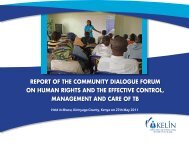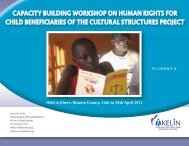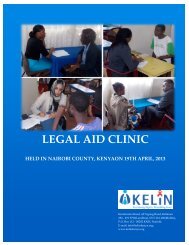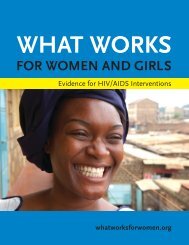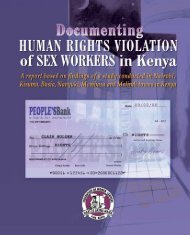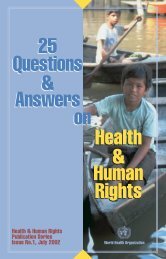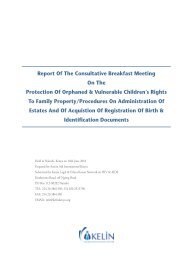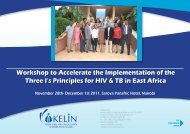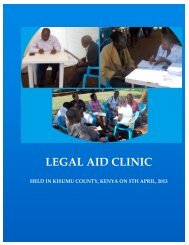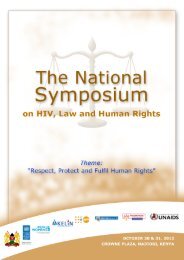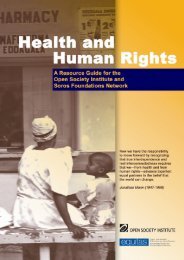National Guidelines on Management of Sexual Violence in Kenya
National Guidelines on Management of Sexual Violence in Kenya
National Guidelines on Management of Sexual Violence in Kenya
Create successful ePaper yourself
Turn your PDF publications into a flip-book with our unique Google optimized e-Paper software.
3. Counsel<strong>in</strong>g Different Groups Affected by <strong>Sexual</strong> <strong>Violence</strong><br />
Male Survivors <strong>of</strong> <strong>Sexual</strong> <strong>Violence</strong><br />
When counsel<strong>in</strong>g male survivors <strong>of</strong> sexual violence, counselors need to be aware<br />
that men have the same physical and psychological resp<strong>on</strong>ses to sexual violence<br />
as women. Men experience Rape trauma syndrome (RTS) <strong>in</strong> much the same way as<br />
women. However, men are likely to be particularly c<strong>on</strong>cerned about their mascul<strong>in</strong>ity;<br />
their sexuality; op<strong>in</strong>i<strong>on</strong>s <strong>of</strong> other people (i.e. afraid that others will th<strong>in</strong>k they are<br />
homosexual); the fact that they were unable to prevent the rape.<br />
Children Survivors <strong>of</strong> <strong>Sexual</strong> <strong>Violence</strong><br />
The dynamics <strong>of</strong> child sexual abuse differ from those <strong>of</strong> adult sexual abuse. In<br />
particular, children rarely disclose sexual abuse immediately after the event. Moreover,<br />
disclosure tends to be a process rather than a s<strong>in</strong>gle episode and is <strong>of</strong>ten <strong>in</strong>itiated<br />
follow<strong>in</strong>g a physical compla<strong>in</strong>t or a change <strong>in</strong> behaviour (WHO 2003). The counselor<br />
should make an effort to believe <strong>in</strong> and trust the child, create rapport, let the child go<br />
at her/his own pace and listen carefully with understand<strong>in</strong>g. The counselor needs to<br />
be familiar with the protocol <strong>on</strong> counsel<strong>in</strong>g children.<br />
Pers<strong>on</strong>s with Disabilities - Survivors <strong>of</strong> <strong>Sexual</strong> <strong>Violence</strong><br />
Counselors need to be aware that people with developmental disabilities and have<br />
been sexually abused have challenges to “work through” or talk about their traumatic<br />
experiences <strong>in</strong> a treatment or therapeutic sett<strong>in</strong>g. Guardians may also need assistance<br />
as caretakers <strong>of</strong> the abused. Counselors should not have prejudices about people<br />
with disabilities. For example, the benefit <strong>of</strong> psychotherapy for people with mental<br />
retardati<strong>on</strong> as well as the impact <strong>of</strong> the abuse should not be questi<strong>on</strong>ed. Counselors<br />
should debrief the guardian and/or family members and make appropriate referrals.<br />
Perpetrators <strong>of</strong> <strong>Sexual</strong> <strong>Violence</strong><br />
Counselors need to be aware <strong>of</strong> their own fears about how they would counsel a<br />
suspected perpetrator. When a perpetrator enters the cl<strong>in</strong>ic escorted by police<br />
or a relative, the counselor will let them know that everyth<strong>in</strong>g discussed between<br />
them (counselor and the perpetrator) is c<strong>on</strong>fidential and the counselor is not under<br />
obligati<strong>on</strong> to disclose any test results, except when the counselor is required to do so<br />
by law.<br />
19




